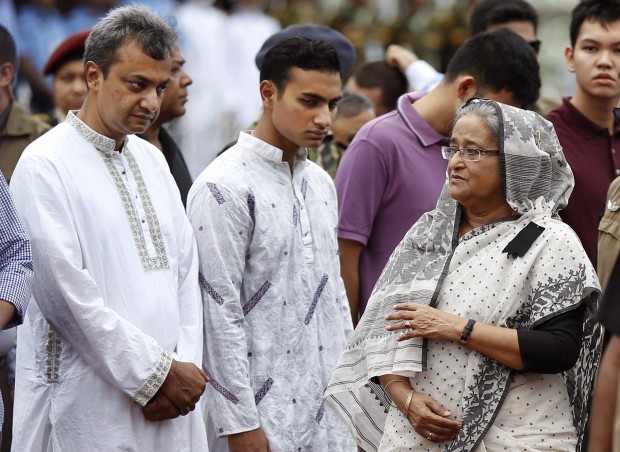Bangladesh Faces Terror

Bangladeshi Prime Minister, Sheikh Hasina, talks to the relatives of Bangladeshi victims of the attack on Holey Artisan Bakery during a memorial service in Dhaka, Bangladesh, Monday, July 4, 2016. The brutality of the attack, the worst convulsion of violence yet in the recent series of deadly attacks to hit Bangladesh, has stunned the traditionally moderate Muslim nation and raised global concerns about whether it can cope with the increasingly strident Islamist militants. (AP Photo)
While the people of Bangladesh are in the grip of panic and anxiety following the gruesome terrorist attack in the capital city Dhaka, the government has tightened security measures all over the country. Prime Minister Sheikh Hasina has asked the authorities of all the 64 districts of the country to form committees everywhere to trace militants and foil their organized threats.
“We won’t allow the emergence of militancy in the country. We don’t want Bangladesh to be the land of militancy … we’ll have to take some measures keeping this view in mind,” the Prime Minister asserted while sharing views with district authorities on July 12-13 through video conferencing. She also urged the people to remain alert against anymore terrorist attacks and prevent those unitedly.
Bangladesh has been experiencing terrorist attacks by Islamist militants for the last one year, and during this period some 50 people lost their lives due to such grisly attacks. All the previous attacks before July this year were target killing and most of the victims were non-Muslim priests and also free-thinking writers, teachers, and bloggers.
But the recent terrorist attacks occurred on July 01 and July 07 were more organized and violent in nature that shook the entire nation. On July 01 at 8.40 pm, a popular restaurant namely Holey Artisan Bakery located in the diplomatic zone of posh Gulshan area in the capital city came under a horrific militant attack. A gang of five armed militants entered the restaurant and made three dozens of guests, both locals, and foreigners, hostage at the gunpoint. Then they killed 20 hostages slitting their throats by sharp weapons. They also used firearms. A group of policemen who were on duty nearby, rushed to the spot, but they could not do anything, rather two senior officers were shot dead by the militants. Next morning, at around 9 am, well-equipped army commandoes forced their entry into the restaurant and killed all the five militants and rescued 13 hostages. The army action, code-named ‘Operation Thunderbolt’ took only 13 minutes to bring the situation under control and all the commandoes remained safe. But, unfortunately, bodies of 20 hostages, including 10 women, were found in a pool of blood.
Among the 20 victims, nine were Italians, seven were Japanese, one Indian and three Bangladeshis. The Italians and Japanese were in Dhaka for business purpose while the Indian lady was a tourist.
Soon after the militant attack, the IS (Islamic State), a the Middle East based Islamist militant organization claimed responsibility for the attack and released photographs of the five militants who conducted the attack on the Holey Artisan Bakery restaurant. The government, however, said that the attackers belonged to Jamiatul Mudarresin Bangladesh (JMB), a banned terrorist organization. Though the government denies the organizational presence of IS in Bangladesh, it is presumed by the experts that IS has established a link with JMB in the country.
The second major militant attack in recent times occurred on July 07 morning at Sholakia in Kishoreganj district near Dhaka. It was the day of the Eid-ul-Fitr, the biggest religious festival of the Muslims. At the vast ground of Sholakia, nearly 300,000 Muslims gathered to offer prayers for Eid-ul-Fitr that morning. The Sholakia gathering is considered as the biggest congregation of Muslims in the country which is being held every year for more than a century. Soon after the prayers began, a gang of eight militants attacked a team of policemen who were on duty on the road towards Sholakia prayer ground. The militants were equipped with firearms, explosives and sharp weapons like machetes. They hurled bombs towards policemen and then opened fire. Police also retaliated and fired on the attackers. In the sudden attack, two police constables died and at least six were injured. One of the militants died on the spot, one was injured and caught while others fled the scene. According to confessional statement of the arrested militant, the attack on Gulshan restaurant in Dhaka and at Sholakia were planned by their leader earlier. Police also believe that the two attacks in Dhaka and Sholakia were conducted by same terrorist group JMB.
After the two attacks, which were never-seen-before, the policy makers and law enforcers have tightened their security measures all over the country. Special security measures have been taken for the diplomatic enclave in Gulshan while security has been tightened at all key installations in the country including the airports and sea ports. Bangladesh has three international airports, 13 domestic airports and four sea ports.
Before the recent two incidents, many more attacks were conducted in different districts of the country. All these incidents were target killings conducted by the group of youths and in all the cases the miscreants used sharp weapons like machetes. Police, as well as experts, believe that the recent incidents, as well as past incidents during last one year, are linked and organized by the same terrorist organization.
Besides JMB, the prime suspect of the police, there are few more such organizations, which are more or less active. One of those is Ansarullah Bangla Team (ABT) and Hizbut Tahrir. The government already banned six militant organizations and a good number of their leaders and activists are now in jail.
However, the past incidents of militancy and terror, especially the recent two terror attacks are wake-up calls for the law enforcers and all concerned to adopt a stringent and well-planned policy to keep Bangladesh free from militancy and terrorism.























































